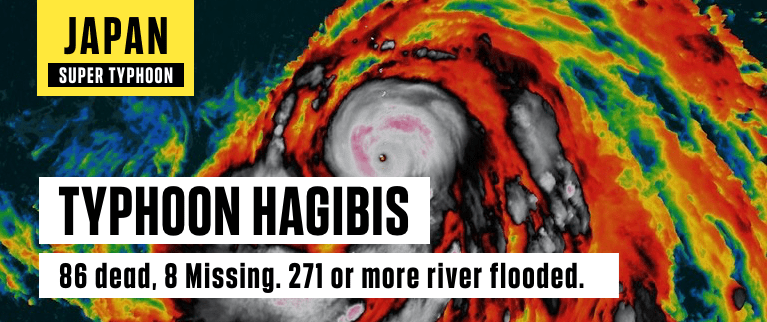
Photo CNN
Fossil fuel companies have knowingly pushed our climate to the brink of collapse and are now threatening to take us over the edge. This industry is made powerful through global banks that finance new fossil fuel expansion. Ironically, Japenese banks are among their biggest financiers. Join us in calling on Japan’s big banks to publicly commit to not funding any new coal projects, including the controversial Vung Ang 2 coal fired power plant in Vietnam.
On October 12, Typhoon Hagibis made landfall on Japan, bringing with it record-breaking rainfall and causing massive destruction.
Over 271 rivers in 16 prefectures overflowed, flooding or damaging more than 68,500 homes. The death toll has reached 86, and the full picture of the damage is yet to be seen.
“I’ve never experienced this kind of thing. I don’t know what to do,” 84-year-old Mitsue Ota said at a gymnasium in Hachioji where she was taking shelter after moving from her home near a river in the city. “I’m worried about the river’s water levels.”

Photo: Mainichi Shinbun
In Nagano Prefecture, the Chikuma River’s levee collapsed, causing devastating flooding in the surrounding river bank area. At least 482 mudflows and landslides have been recorded in 20 prefectures, and more than 138,000 homes were without running water.

Photo: Bloomberg

Photo: JIJI Press
In Hakone, Kanagawa Prefecture, 922.5mm of rain fell in 24 hours on October 12, setting a new record in Japan, exceeding the previous record by more than 70mm (851.5mm recorded in Yanase, Kochi Prefecture).
And from October 12–15, a combination of high tides and storm surges increased the coastal sea levels from Kanagawa Prefecture to Shizuoka Prefecture. Multiple new sea level records were set in Odawara (Kanagawa Prefecture), and in Irouzaki, Omaezaki-shi and Shimizu Port (Shizuoka Prefecture).

Photo: NHK
According to the East Japan Railway company, the Nagano Bullet Train Compartment Centre in Akanuma Nagano-shi flooded, damaging 120 shinkansen cars stationed there.

Photo: Kyodo News
According to TEPCO (Tokyo Electric Power Company Holding) about 430,000 households in 8 prefectures and Tokyo Capital faced blackouts.
The Intergovernmental Panel on Climate Change and the Japan Meteorological Agency have reported that the severity of Typhoon was linked to global heating. Improved infrastructure is needed — but it’s not enough.
Fossil fuel and coal finance has devastating impacts on accelerating the climate crisis. Japanese public and private banks are among the top financiers of the global coal industry.
The proposed Vung Ang 2 coal fired power plant in Vietnam is controversial in many ways. It raises grave health and human rights concerns, as impacted communities in Vietnam are already suffering from air, water and environmental pollution from existing projects near their neighborhoods. It also contradicts banks’ own credit policies that explicitly state that they stop financing new coal projects.
Join us in calling on Japan’s big banks to publicly commit to not funding the Vung Ang 2 and any new coal projects. Delivering thousands of signatures before the possible announcement on 1 November could be the last push needed to get Japan’s banks across the line and stop funding coal across the globe.

References:
- https://www3.nhk.or.jp/news/html/20191015/k10012131581000.html
- https://www3.nhk.or.jp/news/html/20191013/k10012128411000.html
- https://trafficnews.jp/post/90457
- https://tenki.jp/forecaster/deskpart/2019/10/13/6288.html
- https://www.nhk.or.jp/politics/articles/lastweek/24334.html